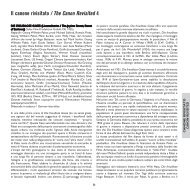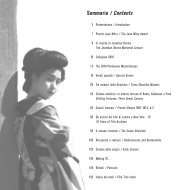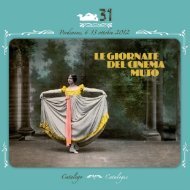Le Giornate del Cinema Muto 2005 Sommario / Contents
Le Giornate del Cinema Muto 2005 Sommario / Contents
Le Giornate del Cinema Muto 2005 Sommario / Contents
Create successful ePaper yourself
Turn your PDF publications into a flip-book with our unique Google optimized e-Paper software.
Il romantico mondo di Elinor Glyn / The Romantic World of Elinor Glyn<br />
Elinor Glyn (1864-1943), nata Sutherland, nacque sull’isola di Jersey e trascorse parte <strong>del</strong>la sua infanzia in Canada con l’aristocratica<br />
nonna francese. Bella, capelli fulvi ed occhi di smeraldo, in possesso di (o posseduta da) una fin troppo fertile immaginazione, a 28 anni<br />
sposò un ricco proprietario terriero, Clayton Glyn (che affittò una piscina pubblica per poter ammirare la sua sposa che nuotava nuda).<br />
Nel 1900 pubblicò il suo primo romanzo, The Visits of Elizabeth. Fu un immediato successo, che si dice abbia anche ispirato Anita Loos<br />
per il suo Gentlemen Prefer Blondes. Seguirono altre storie d’amore e di scandali nell’alta società: The Reflections of Ambrosine (1902),<br />
The Vicissitudes of Evangeline (1905) e Beyond the Rocks (1906). Il vero succès de scandale fu però Three Weeks (1907), che le diede<br />
fama, vendendo in breve due milioni di copie, rimpinguò il patrimonio <strong>del</strong> signor Glyn ed ispirò gli anonimi versi, “Vi piacerebbe peccare<br />
/ con Elinor Glyn / su una pelle di tigre? / O preferireste / errare / con lei / su un altro vello?”<br />
Ad una prima lettura i romanzi <strong>del</strong>la Glyn sembrano melense romanticherie, ma sottendono un umorismo tagliente, una certa ironia ed un<br />
genuino disprezzo per la decadenza e l’ipocrisia <strong>del</strong>l’alta società a cui, nondimeno, la scrittrice aspirava. Dal 1908 al 1916 fu l’amante di<br />
Lord Curzon, ex viceré <strong>del</strong>le Indie. Sua sorella Lucy divenne la couturière Lucile, sposata a Sir Cosmo Duff Gordon: i due ebbero un<br />
momento di notorietà per aver lasciato il Titanic, in procinto di calare a picco, su una scialuppa che avrebbe potuto ospitare molti altri<br />
passeggeri.<br />
Nel 1920 Elinor andò a Hollywood, dove la Famous Players stava girando il film tratto dal suo romanzo The Great Moment, e vi rimase per<br />
un decennio come sceneggiatrice (adattando anche suoi lavori, quali His Hour, Three Weeks e Beyond the Rocks) e guru <strong>del</strong>l’etichetta,<br />
<strong>del</strong>le buone maniere e <strong>del</strong> sesso. Fu all’apice <strong>del</strong>la celebrità come inventrice <strong>del</strong>l’“It”, quella “qualità indefinibile” propria <strong>del</strong> sex appeal;<br />
era stata la Paramount a commissionarle il racconto omonimo, mentre il film It (1927) lanciò la carriera stellare di Clara Bow. Come<br />
commentò Anita Loos, “Se Hollywood non fosse esistita, Elinor Glyn avrebbe dovuto inventarla.”<br />
Tornando in Inghilterra, Madame Glyn (com’era ormai chiamata) diresse due pellicole sonore in qualche modo disastrose, Knowing Men<br />
(1930) e The Price of Things (1930), ma continuò lo stesso a scrivere fin quasi alla morte, avvenuta nel 1943, restando fino alla fine un<br />
personaggio controverso e ricco di glamour esotico, una figura, disse Cecil Beaton, “di grande bravura e coraggio”.<br />
DAVID ROBINSON<br />
Elinor Glyn (1864-1943) was born Elinor Sutherland on the island of Jersey, and spent part of her childhood in Canada with her<br />
aristocratic French grandmother. Beautiful, red-haired, emerald-eyed, and possessed of (or by) an over-vivid imagination, at 28 she<br />
married a rich landowner, Clayton Glyn (who hired a public swimming pool so that he could watch his bride swim naked). In 1900 she<br />
published her first novel, The Visits of Elizabeth. An instant success, it is reputed to have been an influence on Anita Loos’s Gentlemen<br />
Prefer Blondes. This was followed by more stories of love and scandal in the best society – The Reflections of Ambrosine (1902), The<br />
Vicissitudes of Evangeline (1905), and Beyond the Rocks (1906). It was, however, Three Weeks (1907) whose succès de scandale brought<br />
her fame, rapidly sold two million copies, supported Mr Glyn’s declining fortunes, and inspired the anonymous rhyme, “Would you like to<br />
sin /With Elinor Glyn / On a tiger skin? / Or would you prefer / To err / With her / On some other fur?”<br />
At one level Glyn’s novels are romantic tosh; but underlying them is sharp humour, irony, and a genuine scorn for the decadence and<br />
hypocrisy of the high society to which she nevertheless aspired. From 1908 to 1916 she was the lover of Lord Curzon, former Viceroy of<br />
India. Her sister Lucy became the couturière Lucile, wife of Sir Cosmo Duff Gordon. As survivors of the Titanic, the Duff Gordons earned<br />
notoriety for having left the sinking ship on a lifeboat that could have held many more passengers.<br />
In 1920 Elinor went to Hollywood, where Famous Players were filming her novel The Great Moment. She stayed on for a decade as a<br />
screenwriter (adapting her own His Hour, Three Weeks, and Beyond the Rocks) as well as guru of etiquette, manners, and sex. She<br />
achieved her greatest celebrity as the prophet of “It” – the “undefinable quality” of sex appeal. Paramount commissioned the novella of<br />
that title, while the film It (1927) assured Clara Bow’s starring career. As Anita Loos commented, “If Hollywood hadn’t existed, Elinor Glyn<br />
would have had to invent it.”<br />
Returning to England, Madame Glyn (as she was now generally styled) directed two somewhat disastrous talking pictures, Knowing Men<br />
(1930) and The Price of Things (1930), but continued writing almost until her death in 1943, remaining to the end a personage of<br />
controversy and exotic glamour – a figure, said Cecil Beaton, “of great bravura and courage”. – DAVID ROBINSON<br />
115<br />
ELINOR GLYN
















